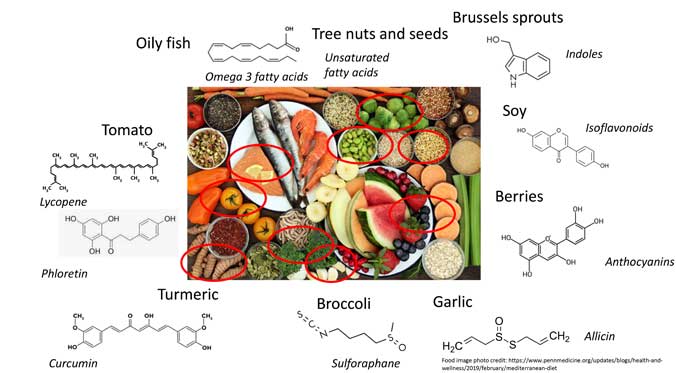The Complex, Natural Biochemistry of a Healthy Diet

During Prostate Cancer Awareness Month, PCF hosted a webinar, “The Science of Nutrition and Prostate Cancer.” One of our panelists, the accomplished nutrition researcher Prof. Richard Mithen, presented an overview of diets and foods that have been linked to a lower risk of cancer, and in some cases, prostate cancer. Mithen, professor of nutrition at the University of Auckland and PCF Challenge Award recipient, has been a leader in this field for decades.
Prof. Mithen began with the “Big Picture” by outlining the benefits of plant-based and Mediterranean diets, emphasizing the importance of eating a large variety of plant-based foods. Oily fish, such as salmon, is a healthier animal protein alternative. These general principles, along with regular exercise, offer a path to good overall health.
Prof. Mithen then went on to discuss a variety of fruits, vegetables, protein sources, and even spices that have the potential to affect health, and possibly prostate cancer specifically. Although it’s tempting to believe that diet is an exact science, there is a lot of complex biochemistry associated with it. This is because unlike taking a medicine (which has a high concentration of one molecule made to target a specific protein or chemical reaction in the body), diet means that you eat small amounts of a large number of molecules, creating an intricate web of reactions with many changing variables. Broccoli, for instance, contains many phytochemicals and nutrients in addition to cancer-fighting glucoraphanin (more on that below), including: fiber, vitamins, and minerals. All of these affect the body in some capacity, and may differ somewhat from person to person.
Broccoli remains at the forefront of Prof. Mithen’s research, as current evidence suggest that it offers meaningful potential to reduce prostate cancer risk or risk of cancer progression. This is because broccoli contains glucoraphanin, which is converted to the active molecule sulforaphane by the gut microbiota (a.k.a., “bugs in your gut”). Within a few hours, sulforaphane is absorbed throughout the body and accumulates in the prostate gland. Sulforaphane has general health benefits due to its ability to turn on hundreds of genes in the liver associated with anti-oxidant defense, anti-inflammation, and the excretion of foreign pollutants. Beyond that, sulforaphane may directly affect the prostate itself by fighting the growth of tiny cancers that have the potential to become larger. Prof. Mithen has developed new varieties of broccoli with different amounts of glucoraphanin, including those with up to 7 times higher than regular broccoli. In a PCF-funded study, men with localized prostate cancer on active surveillance consumed a “broccoli soup” weekly. After 12 months, men who ate the broccoli soup containing the highest amounts of glucoraphanin had reduced changes of expression in their prostate gland of genes that are thought to drive cancer progression, suggesting that glucoraphanin (sulforaphane) may indeed directly affect the risk of aggressive prostate cancer.
Mithen concluded his presentation by emphasizing that while there is no dietary magic bullet—not even broccoli—lifestyle changes including more plant-based foods, less red meat and dairy, and increased exercise lead to better health, and certainly will not cause harm. Examples of foods containing important phytonutrients include broccoli, turmeric, tomatoes, garlic, Brussels sprouts, and berries….and there are so many more to choose from.
You can watch Prof. Mithen’s talk along with the full webinar here.









